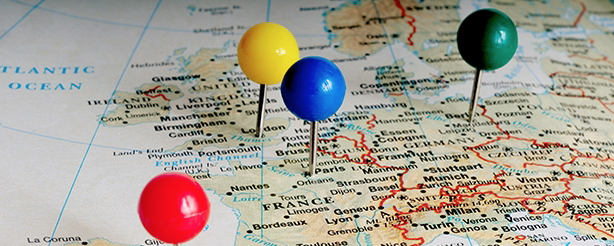


Linkedin should be about business, not about about politics. But what if politics is big business? With the end of the presidential elections in the US, comes the moment that a lot of, mostly bruised, campaigners start looking around for new job opportunities. Many of them will eye Europe as a potential market for their services. After a question coming from Campaigns & Elections, the great trade magazine for the campaign industry, I was inspired to write this market assessment for all American campaigners considering to cross the Atlantic - in the meantime telling many people here also a thing or two about a changing market.
Huge differences
For those of you political consultants considering a move to Europe, beware. Though there are quite a number of big elections coming up, only a possible election in Britain (not unthinkable in 2017) can be compared to an election in the US. There are huge differences. The money is much, much less, to start with a simple one. Privacy is another. You come with a proposal for multi-channel data approach, using email, robocalls and the like? No way, brother. The law and a lack of funds stands in the way in most Western European countries. So how to campaign?
By being extra smart. Like in the Anglo-Saxon countries there is a big effort to innovate in each campaign, but it works differently. Apart from money, this also has to do with the fact that we are talking about multiparty democracies, so resources are extra scarce. In a way every party has to think like a start-up. This is extra true because usually a formal threshold of 2% or less is enough to get you into parliament with your own party. A threshold that used to be enough in the past, but no longer.
A premium on being different
Beppe Grillo’s ‘Five Star Movement’ is a prime example. Now the largest opposition party in Italy, it started out as an anti-politics party, led by a comedian, and Grillo is adamant it should remain as chaotic and alternative as it is.
Perhaps the most interesting case is The Netherlands. The party that is now largest in the polls is the PVV, of Mr. Wilders. Wilders could be (and has been?) a model for Mr. Trump. Starting out from an established party, in 2004 he literally became a one-man party. He now has a group of parliamentarians behind him, but they have no speaking rights unless he says so. He scolds the media, refuses to appear in their shows, and makes himself so scarce that literally every tweet is major news. Sounds familiar?
The problem with one man bands like that of Mr. Wilders, is that they are rarely good people managers. By now the number of new parties created by his former followers is at least ten, depending on how you count, all claiming an electoral position. Added to this ‘splintering’ of parliament is a raging debate about the merits of representative democracy. Referenda and other forms of direct democracy are popular. So what you see, is that parties seek a distinction by a non-traditional party design.
Where's the money?
In March 2017 there will be a general election in the Netherland. In Parliament there are now 17 parties (in a Parliament with only 150 seats!). About 8 of them can be considered traditional parties. Apart from the parties already in parliament, there are 40 other parties wanting to join the action. Even the largest party in government has no more than, say, 5 million euros’ campaign money available. So free publicity is your only ticket in. For this a leader or party structure that is not traditional is a must. This time, the new kids on the block all show themselves as champions of direct democracy. In two cases this is really going far.
Party redesign
There is a party leader who promises that once he and his fellow candidates are elected, they absolutely will not take their seats. This is because the party represent those who do not vote. The more votes the party gets, the more seats stay unseated and the more representative parliament becomes.
There is another party – called ‘No Poll’, born from a website called ‘No Style’, which is fitting - where the candidates must promise they will only vote what their members tell them to vote. For this the members get a digital platform. Members pay fee for this privilege. Cameras will be in the chambers of the parliamentarians at all times, so everything is transparent.
There is a real chance this ‘No Poll’ party will get into parliament. They certainly have a better chance than parties coming with traditional platforms and methods. And they have a better business model if successful, without having to do any traditional campaigning.
Less is more
So less is more when campaigning on the continent of Europe. But if you have an innovative concept for the design of a party, you probably are welcome. Does this redesign business translates into a good business model for a consultant used to American money? Not likely, expert for a very few. Traditional parties will remain dominant in the European market, which also means a poor business model in most cases. No offence, but Europe is no real alternative for the American campaign market. So perhaps you should stay in the US and do some redesigning there.
Peter Noordhoek is a consultant and former campaign manager for the Christian-democratic party in The Netherlands. As a trainer and (data) expert he works extensively throughout Europe.